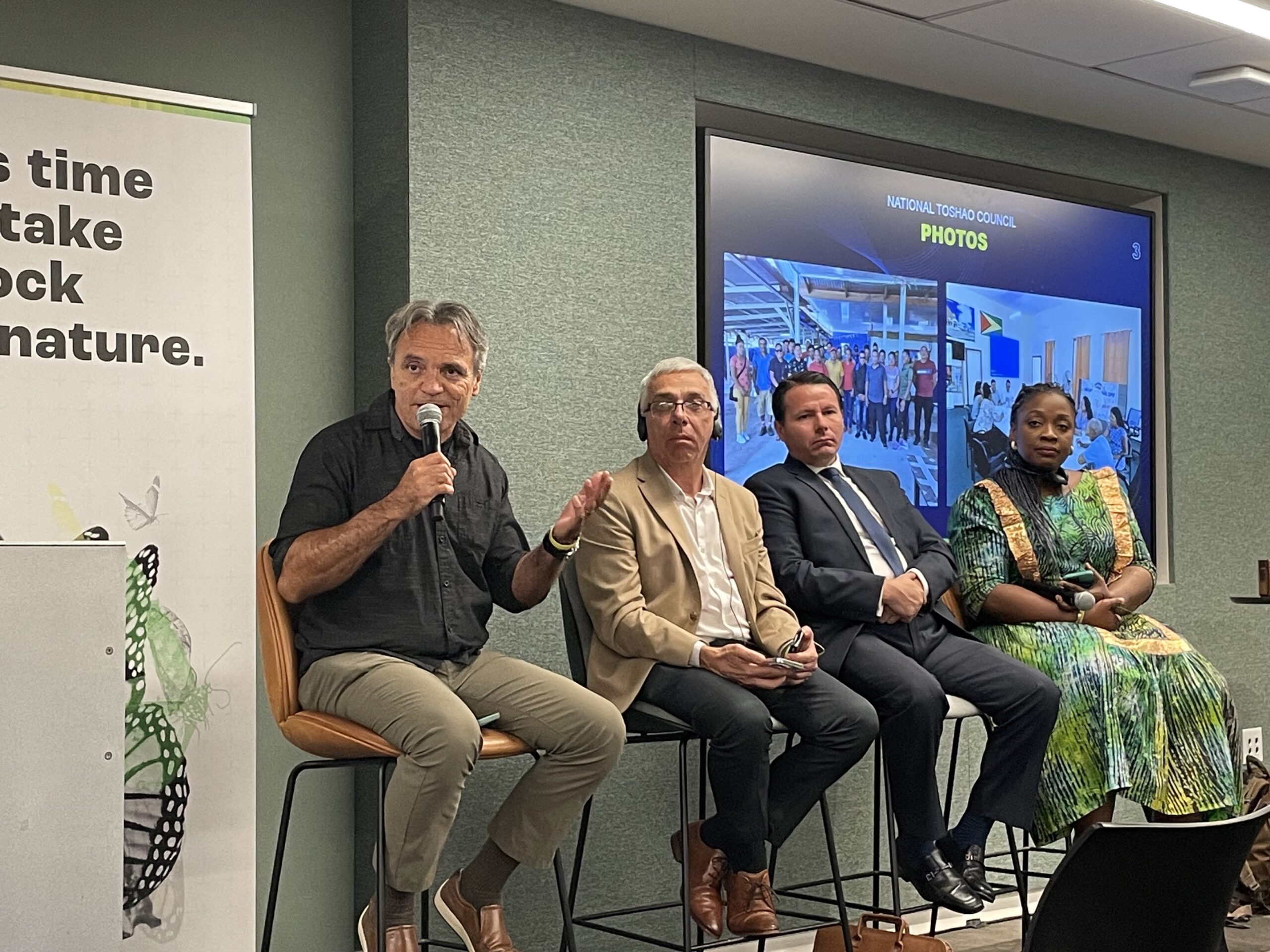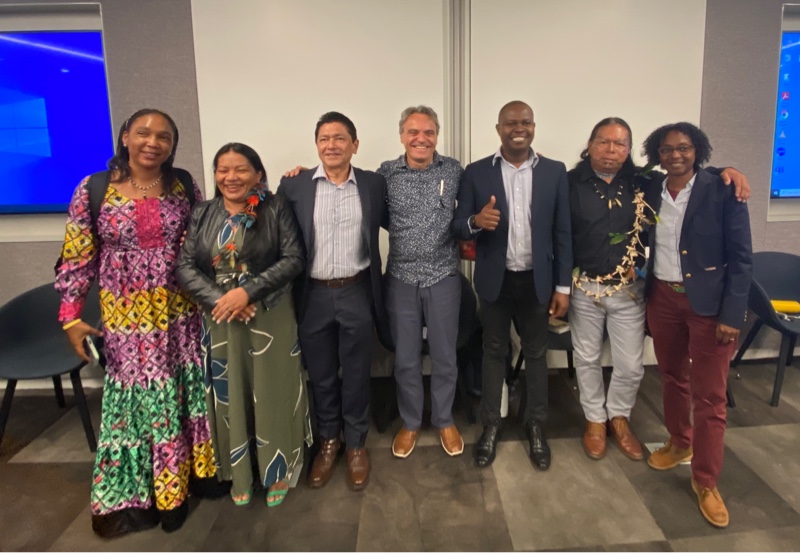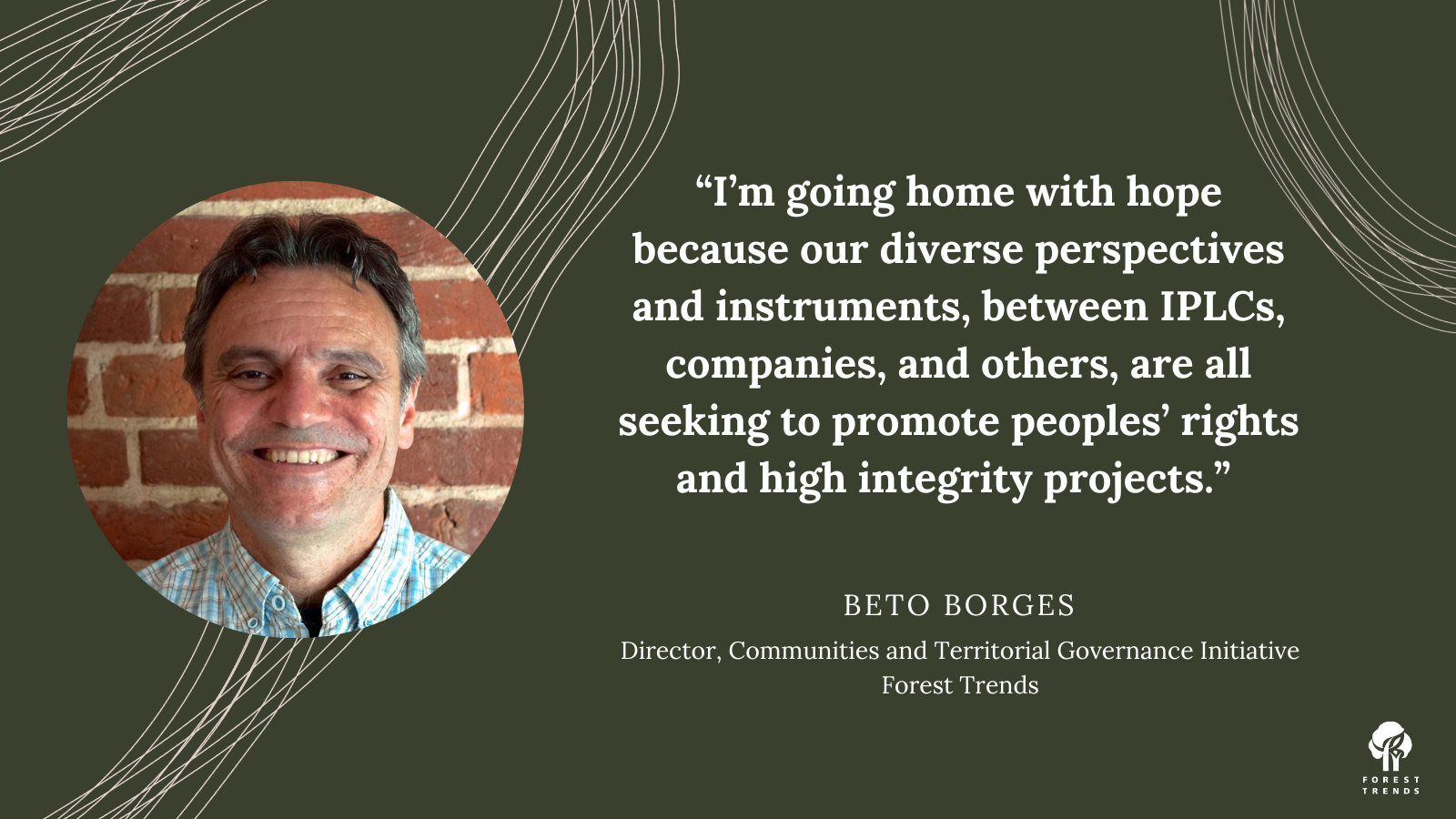Last week, members of our team gathered in New York City for New York Climate Week 2023. Actors across the climate action space, from companies and NGOs to indigenous organizations and governments, gathered at the Nature Positive Hub, hosted by Nature4Climate. The focus of the Nature Positive Hub was to align nature and nature-based solutions with global climate goals and to help actors make the leap from ambition to implementation. Our team returned with three clear messages:
1. Partnerships need to focus on shared responsibility, rather than “support” and must be built on trust before finance reaches the ground.
What rang loud and clear from indigenous and local panelists throughout Nature Positive Hub events is that it is time for market actors to step up. At COP26 Glasgow in 2021, $1.7 billion was pledged to indigenous and local communities, yet a year later only 7% of these funds actually reached communities. This New York Climate week marks almost three years since these pledges, and communities are still searching for promised finance on the ground.
These communities are under immense pressure and cannot wait for investors and academics in the Global North to agree on the perfect way forward to keep providing the vital service of forest protection (i.e., the perfect is becoming the enemy of the good). Many agreed during a session hosted by Wildlife Conservation Society that at the end of the day, all actors need to “pony up” and start transacting carbon credits. Josh Tosteson, President of Everland, framed the market as a mechanism both “in service and in responsibility to” indigenous forest stewards.

Roselyn Fosuah Adjei, Director of Climate Change for Ghana’s Forestry Commission and one of Josh’s co-panelists, emphasized the need for a shift from a “support” to shared responsibility mindset in the market, including direct, up-front financing to communities on the front lines of climate change. “We need to see the demand [for carbon credits] actually becoming tangible,” she said. Looking beyond a single, up-front investment is what can enable communities to build more resilient governance and economic initiatives in the long-term.
Relationships built on trust, especially between indigenous and local communities and governments and/or companies, are particularly important to sustaining integrity and shared responsibility in the market. To this end, during Climate Week, Forest Trends, Everland, and Wildlife Works launched the Equitable Earth Coalition, which, in close partnership with indigenous peoples, local communities, and Global South countries, “is committed to developing a new voluntary carbon market standard and platform to help end deforestation and biodiversity loss by driving finance directly to communities.”
2. Carbon market actors need to counter negative press and greenhushing by sharing their project success stories and amplifying the data that show carbon credits are essential to climate action and ambition.
Market actors throughout Climate Week reported feeling unmoored by a string of recent news stories calling into question voluntary carbon markets effectiveness and the motives of those who engage in the market. Yet as emphasized by Beto Borges, Director of our Communities and Territorial Governance Initiative earlier this year, condemning all carbon markets due to confused data analysis or a few bad actors puts a critical source of funding for climate action at risk, especially for indigenous and local communities who need direct finance to continue protecting and managing their forests.
Moreover, one leading project developer told us that in the absence of a “safe space” to invest in carbon offset projects, investors, like companies, will either keep quiet about their emissions reductions strategies (“greenhushing”) or stop participating in carbon markets altogether. This is a blow to market transparency, climate ambition, and achieving global emissions reductions goals. Like investments in any other economic market, there will always be inherent risk in investing in carbon credit projects, and it remains important that companies feel encouraged to take this risk without being attacked by media, even if the outcome is not perfect the first time around.
One proposed way to start reclaiming the narrative is for the carbon market space to share more success stories from carbon offset projects on the ground. Showing people how their investments in or public support of high-integrity projects affect the lives of people on the front lines of climate change and forest protection could go a long way in making the human connection to carbon markets more obvious for less technical audiences. Just as importantly, we need more than “anecdata” on how companies are really using carbon credits as part of their climate strategies. Ecosystem Marketplace is releasing some major new analysis on this next month (Register for their webinar here).
3. Not going “beyond carbon” is a missed opportunity.
Another message repeated throughout Climate Week, especially from indigenous and local community representatives, is that market actors need to do a better job capturing the whole picture when we think about valuing carbon credits and the activities associated with generating them. Gustavo Sánchez, President of Red MOCAF in Mexico defined looking beyond carbon as valuing people, traditional knowledge, community wellbeing, and biodiversity. Communities are much more than just “beneficiaries” of a carbon project, they’re essential partners. Yet, traditional knowledge is generally not acknowledged or paid for like western concepts of intellectual property rights.
Broadening carbon project focus to include specific community concerns is not just about equity; it helps address the root causes of deforestation and land degradation, such as lack of livelihood opportunities in forest communities and not having the resources to resist illegal incursions on protected land.

Francisca Arara, Secretary for Indigenous Peoples, State of Acre, Brazil and one of Gustavo’s co-panelists added that “Money can’t change everything, but it is important to complement existing activities in our territories, to improve food security, technology, communication, youth inclusion, and capacity building. [Direct, up-front financing] helps enable us to live how we want to live and strengthen our ways of life.” Engaging communities as equal partners from day one to co-create projects is a good place for any company, project developer, government, or NGO to start.
Companies are also increasingly seeing the consequences of not looking beyond carbon. Carbon-related activities are usually considered “finance” and siloed from activities connected to “nature,” such as water, agriculture, and biodiversity conservation. While these institutional silos can make some big challenges feel more manageable, it limits our ability to employ systems thinking to solve environmental problems, which do not lie neatly within the boundaries we create for our own convenience. The launch of the Taskforce on Nature-related Financial Disclosures’ (TNFD) risk management and disclosure framework during Climate Week is a promising signal that companies, financial institutions, and others are increasingly recognizing the financial risk of not addressing nature loss and are developing ways to better integrate their climate and nature priorities. The TNFD hopes to help companies recognize their nature-related risks, then report these risks in a more standardized, accessible way.
All sectors depend on nature to some degree. Cross-silo thinking and tools to support its implementation in a business environment is what is so desperately needed to generate real, concrete action towards the 2030 targets we are quickly approaching. Focusing on just emissions reductions or species conservation or water access is not cutting it anymore. The world needs systems-level change. As part of the life on this planet and those responsible for climate change, it is our responsibility to work on collaborative solutions that shift how we do business and interact with nature and keep building an equitable future for generations to come. We look forward to building on the momentum we experienced at New York Climate Week as we prepare for COP29 Dubai in a few months-time.

Viewpoints showcases expert analysis and commentary from the Forest Trends team.
Connect with us on Facebook and Twitter to follow our latest work.
